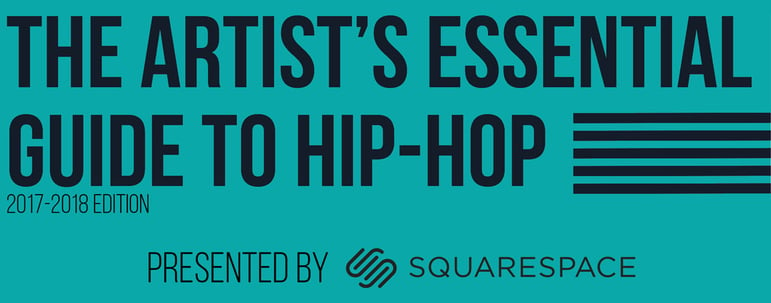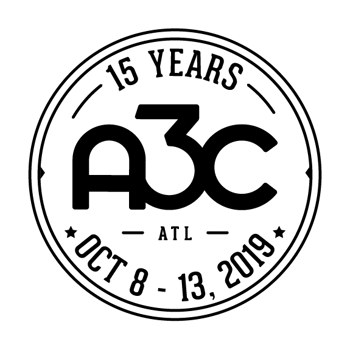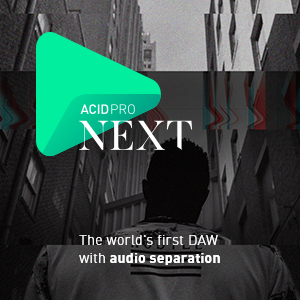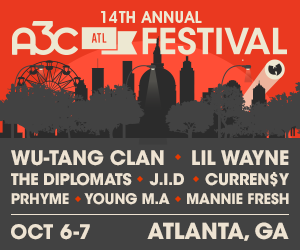Regardless of what style of hip-hop music you make, your end goal or your reason for becoming a music artist, there’s always going to be a discussion about money. Why? Money not only gives you the ability to be a full-time artist, it also allows you to reach more people and have more creative freedom. If you are an artist wondering how to monetize your music in a streaming world, where CDs and music sales are no longer the norm - keep reading. We’ve got a lot to talk about.
Need more advice? Read other chapters of our Artist Guide here.

The Artist's Essential Guide to Hip-Hop is presented by Squarespace, the simplest way to register a domain and create a beautiful website.
Start your free trial today by visiting squarespace.com/A3C. When you’re ready to go live, use offer code A3C17 to save 10% on your first purchase.
In This Post We’ll Cover
- Why Monetization Matters
- The Rule of 1,000 Fans
- 6 Sources of Revenue
- Pro-Tips
Why Monetization Matters
It’s not uncommon for artists to care more about their musical craft than making money. Creating great music is an essential part of becoming a successful artist, but without money you probably won’t be able to make music for very long.
It doesn’t matter if you record your music in a professional setting or have your own home recording studio; it takes money to make money in this business. Once your music is created, it takes money to develop photos, shoot videos and design graphics. And once you’re ready to release your music, it takes money to market and distribute your product in order to reach fans.
This leaves you with two options:
1. Make Your Own Money
This is straightforward. Making money gives you control of your music career. If you aren’t dependent on anyone else for funding, you can record music and be as creative as you like.
2. Take Money From Someone Else
This option allows you to delay monetizing your music career, but only at the expense of having to share control of your career with someone else. This approach also doesn’t allow you to completely disregard monetizing. Eventually, whoever gave you the money is going to want their money back (and then some).
It’s important to understand that neither option is a good or bad choice. They both have their pros and cons, so make sure to choose the option that you feel is best for your goals and situation.
The Rule of 1,000 True Fans
There’s a concept called “1,000 True Fans,” built around idea that with 1,000 dedicated fans you’ll be able to make a good living as an artist.
In order to make the 1KTF (1,000 True Fans) rule work, you need to:
- Create enough product to that will allow you to make a $100 average profit from each fan.
- Your fans must be able to pay you directly - allowing you to keep the full $100 instead of a small percentage from a record label, retailer, or any other intermediate.
If done correctly, $100 x 1,000 fans = $100,000 per year.
The main influence of this rule is to prove that you don’t need millions of fans in order to become a successful, full-time artist. Instead, you should focus on building genuine relationships with the majority of your fans, even if it may slow down the process of gaining new fans.
With that said, you do need some fans before you can monetize. Without a dedicated fan base, it doesn’t matter how many views you have, who co-signs you, what press you get or how many songs you put out. Fans, that will spend money on your music/art, should be the goal when you’re starting out. It is obtainable and not overwhelming.
Good Sources of Revenue
It’s important to understand that the way you monetize your fan base will be dependent on the type of fans that you have. Every audience is different, so the way you monetize will also be different.
Here are a few avenues to explore:
1. Music Streaming & Sales
Despite what you may have heard music streaming platforms can still be a good source of revenue. The reason music streaming is such a sought after source of income is based on the fact that you don’t have to do any extra work in order to monetize.
There are strategic ways to build your streams, mostly centered around adding your songs to Spotify playlists. Read more about the “Secret Hit-Making Power of Spotify Playlists.” If you’d like to get on popular playlists, do your research on who curates those playlists and reach out to them directly. Certain labels, distribution companies and other power brokers in music have lobbying power and therefore some influence on which songs are placed on the top Spotify playlists.
Once you’ve created music, you can easily distribute it on music streaming platforms (Spotify, Pandora, TIDAL, etc) and start making money.
People still buy music too. We don’t recommend pressing up CDs anymore, but we do believe that you should be selling your music wherever your fans might like to shop. Nowadays there are a lot of great distribution companies that let you retain all publishing rights and enable you get your music into online retailers very quickly, easily and affordably… and you retain all publishing rights.
And if you’re focused on building your fan base like you should be, the number of streams and money brought in should continue to increase.
7 Music Distribution Companies
Bandcamp is another notable company that allows you to upload your music and have it streamed/downloaded - but also allows fans to purchase your music at a price that they choose.
2. Brand Sponsorships
The more fans you have and wider your social media reach, the more opportunity you’ll have to leverage those fans for sponsorship deals. These types of deals can also be affiliate hybrids (deals where a brand will not only pay you to endorse a product, but give you a percentage of the products you sell) which may be more profitable depending on the product and audience. This is usually tracked via coupon code.
Brand relationships should be authentic. You should have a similar fan base with the brand, or it won’t make sense for either party. If you’re approached by a brand that you don’t like, or that you don’t feel fits your personal brand, walk away. It will be a short lived partnership and will probably do damage to your brand and fan base. When the relationship is authentic, and there is a large correlation between both audiences, it’ll be a win-win deal.
We’ll be covering Brand Partnerships in more detail, in a dedicated section, soon.
3. Merchandise
Monetizing your music career through merchandise is one of the best ways to bring in revenue. There are platforms such as Teespring and Merch by Amazon that allow you to start selling merchandise without actually holding inventory. When you’re just starting out, it makes things a lot easier if you don’t have to put up any upfront money in order to test how well your merch will sell.
In the beginning you'll need, at a minimum, someone to design your merchandise. Everything else can pretty much be done between you, your designer and your local post office. Whatever you do for merch, make sure to get creative. T-shirts continue to be the best seller for artists, but your best fans want limited edition creative items. Here are 5 out-of-the-box ideas by Tyler Allen.
Selling merch is more than just putting a link on your website or a few posts. Here are 4 more creative ways to sell more merch.
6 Companies that can help you design, manage and monetize your merchandise.
- MerchCat is a way to organize inventory, track payments, and get real-time reports.
- Gear Launch helps with e-commerce from production to fulfillment to customer service.
- Music Glue is a specialist e-commerce platform for the music business. They make it easy for fans to buy music, merchandise, tickets and experiences directly from the artists.
- Creative Allies is great if you need help designing your merch, check out Creative Allies. Run a contest and engage your graphic designer fans. Creative Allies helps celebrities, artists and consumer brands execute marketing campaigns and engage customers by engaging designers from around the world.
- Qrates helps turn your music into Vinyl. You can start by taking pre-orders or press with crowdfunding from little as 100 copies.
- Teespring is a platform that allows you to create different designs and place them on different pieces of merchandise. That merchandise can then be purchased directly by fans without you having to put any money towards inventory.
4. Live Shows
Live shows, and tours, are an important revenue source for every successful artist. You can either be booked for a show or produce your own.
Getting booked for a show as an up-and-coming artists can be difficult. Promoters don’t want to book artists that can’t bring people out. Before you start hitting up promoters to get on a show, curate your own show and bring out 100+ people. In the early stages of your music career, when your audience is small, the only way you’re going to be able to monetize live shows efficiently is to throw your own. Most of your earlier shows will be promotional opportunities, until your demand gets to a point that you can charge money. Be selective, though; don’t do every show that you’re asked to do. Make sure you don’t over saturate yourself in your own market and focus on creating demand, and monetizing your performances.
If you do produce a show, make sure you leave some money in the budget to professionally document the show with quality video and photos. Try not to charge more than $10 pre-sale and $15 at the door. Remember: the goal is to get people to come out.
Under no circumstances should you do any pay-for-play shows…EVER! The only time you may consider coming out of pocket for a show is if you have an opportunity to open for a dope artist on the road.
Want to make more money on your tour? Check out these cool innovative companies:
- Tip Cow is an app that enables fans to tip you at your live show.
- Merch Roadie is an automated retail machine that allows the sale of 350+ items as a primary or additional location to merchandise booth(s) in high-foot traffic areas of a venue, festival, or pop-up.
We’ll be covering Shows & Touring in more detail, in a dedicated section, soon.
5. Licensing
Licensing is another great way to make money. The amount of money and opportunity for licensing will depend on your popularity, lyrical content and style of music. Most companies license music because of the connection a track has with their product, service or audience. A music supervisor is trying pick a song (for a movie or commercial) that fits vibe or content.
One of the first steps to entering the licensing world is to make sure you own all the rights to your music and have agreements in place with anyone who will get paid on the back end (producers, songwriters, musicians, etc). Make sure you have split sheets for all your music. The company Song Splits will make that process easy for you.
Sign up with a Performance Rights Organization (ASCAP or BMI), which are nonprofits that collect royalty payments from businesses and organizations that play your music publicly.
You can try and place music yourself by reaching out to music supervisors, but that’s a tall mountain to climb. You’re better off submitting your your music to several pre-cleared music licensing sites. For no charge, you’re able to upload any of your pre-cleared (no samples) music. After your music is uploaded, you’re done. These sites try and close deals with TV, Film and Commercials and (should) offer a 50/50 split with the song writers if any music is used. This is a passive source of income for indie artists, but do NOT expect to be getting rich off these deals.
5 Music Licensing Companies:
6. Fan Funding (aka Crowdfunding)
Fan-Funding is an excellent option for any artist hoping to grow, engage and monetize their fan base. Fan-Funding is NOT asking or begging for money.
If done right, Fan-Funding, can be a great:
- marketing campaign for an album release
- sales strategy for merch or show tickets
- way to identify your true fans
- way to collect data and build an email list
- way to engage your fans to talk about you
- story for the press
- way to sell very limited edition and creative experiences or merchandise
We’ll be covering Fan-Funding in more detail, in a dedicated section, soon.
Pro-Tips
- Focus on building fans before trying to monetize your music career.
- The way that you monetize your music career will depend on your goals and fans. Don’t choose a monetization method just because another artist makes a lot of money from it.
- Even if you’re not into music for the money - monetizing your career should be one of your top priorities so that you can continue to make music without needing a record label or having to get a day-job.
- MailChimp is an email marketing platform that gives you the ability to collect email addresses and contact your fans directly. While this may not seem like it can help you monetize, it’s one of the most effective ways to monetize your music career. By having the email of your fans, you will be able to sell to them directly as much you’d like (and for free, up to a certain amount of subscribers).
- SmartURL is a tool that allows you promote music being hosted on several different platforms such as Apple Music, iTunes, Spotify, YouTube, and more --- all from 1 simple link. This helps fans listen and purchase your music on their preferred platform, while all of your marketing efforts go to one link.
Expert Advice: Things are changing so fast in today's music industry that it's important to continuously educate yourself. New ways to monetize your music are being developed every year. 15 years ago artists couldn't monetize their YouTube channel, collect royalties from SoundExchange, or set up a Patreon account. If you aren't aware of the new opportunities as they become available, then you could be missing out on potential money. Read books and blogs, listen to podcasts, and subscribe to relevant newsletters so you can be first to take advantage of the platforms that make sense for you.
- Damien Ritter (Founder or Funk Volume and Music Entrepreneurship Club)
Need more advice? Read other chapters of our Artist Guide here.
The Artist's Essential Guide to Hip-Hop is presented by Squarespace, the simplest way to register a domain and create a beautiful website.
Start your free trial today by visiting squarespace.com/A3C. When you’re ready to go live, use offer code A3C17 to save 10% on your first purchase.



